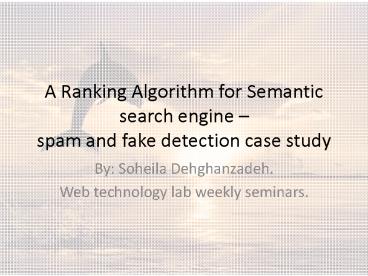A Ranking Algorithm for Semantic search engine PowerPoint PPT Presentation
1 / 23
Title: A Ranking Algorithm for Semantic search engine
1
A Ranking Algorithm for Semantic search engine
spam and fake detection case study
- By Soheila Dehghanzadeh.
- Web technology lab weekly seminars.
2
Agenda
- Web spam definition
- A brief overview of Search engines
- Search engine phases
- Crawling
- Indexing
- Index lookup
- Ranking lookup results
- My proposed ranking algorithm ?
3
Web spam and fake
- In web of data anyone is able to say anything
about anything. - Low quality data should not be mentioned in top
search results.
4
A Search Engine
5
A Search Engine
6
web of data vs. web of documents.
- WODocNo link type and no trustworthiness (just
popularity). - WOData should consider link type and link
context (for provenance and proof of trust).
7
Crawling Indexing phase
- Using ldspider to crawl linked data.
- Using hexastore for complete indexing the crawled
data. Special thanks to Panagiotis Karras for
providing hexastore implementation in python.
8
Index lookup results for extensionsome Results
may not include keyword but they have high
quality and relevance.Result expansion to hide
the locality effect. Some sites is referred many
times but in this special context other
professional sites lookup results are more
interested.
Web of data
result
Crawler
Raw rdf
lookup
ranking
indexing
index
9
HexaStore
- Index structure that we use in our search engine.
- Each RDF element type deserve to have special
index structure build round it. - Every possible ordering of the importance or
precedence of the three elements in the indexing
scheme is materialized. - Each index structure in a hexastore centers
around one RDF element and defines a
perioritation between the other 2 elements.
10
Sample spo indexing in a hexastore
Si
P(I,1) P(I,2) P(I,Ni)
O(i2,1)
O(i2,2)
O(i2,ki2)
O(iNi,1)
O(iNi,2)
O(iNi,kiNi)
O(i1,1)
O(i1,2)
O(i1,ki1)
Space complexity Sposppsosopospo
11
My idea!
- Import the base result set to jena and extend it.
- Extending the base set with ontology reasoning
rules so that extra resources and relations will
be added through reasoning rules. - The added resources
- The added relation has no context so their
trustworthiness is an aggregation function on
(x,y,rule) relations--- - Resources will be added only through sameAs
predicate - Resources will be ranked according to relevance
to query terms (using ontobroker pagerank
objectrank- triplerank HITS,.) - Query
- Keyword query
- Structured query
- Ontology based query (using an interface to get
query) - ontobroker - Relation (properties) will be ranked according to
contexts(provenance) using relation ranking
methods such as semRank or we can look at
contexts pageRank. - Note that First we rank resources and second we
rank relations . However it depends on the user
query whether it is looking for relations or
resources.
12
- Lookup on quads for keyword (Soheila)
- Q1 http//um.s11,givenname,Soheila,UM
- Q2http//NIOC/p25,fullname,Soheila
Dehghan,NIOC - Q3http//nigc-khrz/e66,firstname,Soheila,NIGC
- Q4 http//fake/f4,name,Soheila,fake
Cheese
B.Gates
Scott
Buy(Spam)
Meet(CNN)
Dancewith(FK)
SA(FB)
SA(UM)
http//facebook/u122
http//isport /us122
Q1
SA(UM)
SA(LI)
SA(NIGC)
Q3
Q2
http//linkedIn/u12
SA(FK)
SA(FK)
SA(FK)
Q4
13
Result set expansion methods
- step1 using sameas predicate on found Qaudes and
extend ResultSet to Q1,,Qr - index LookUp
- Q1(S),SameAs,?,??Qr(S),SameAs,?,?
- ?,SameAs,Q1(S),?? ?,SameAs,Qr(S),?
- (Q1,,Q4?Q1,,Q4,FBURI,LinkedInURI,isportURI) in
our case. - apply PR on Extended graph with SameAs which
SameAs links are replaced with PR weight of
sameAs context.(to know the trustwothiness of
each contexts).
14
Result set expansion methods
- Step2 LookUp all properties of Q1(s),,Qr(s)
- Q1(s),?,?,??,?,Q1(s),?
- Qr(s),?,?,??,?,Qr(s),?
- Step4 add inferred relation using domain
ontology(context is composed of
ontologyinference process) - Step4 rank Q1,,Qr according to their TpageRank
(computed online from graph of step1 ), rank
relations according to their context
pageRank(which is computed by Google offline) - Note contexts who has PR lower than a
treshhold wont be mentioned.they maybe Spam or
Fake Sites.
15
Structured query on quads indexes
- Single pivot
- (S,?,?,?),(?,p,?,?),(?,?,o.?),(?,?,?.C)
- Double pivot
- (S,p,?,?),(s,?,O,?),(s,?,?,C),(?,P,O,?),(?,P,?,C),
(?,?,o,C) - Triple pivot
- (s,p,o,?),(s,p,?,c),(s,?,o,c),(?,p,o,c)
16
- Step1 if the specified parts was URI then a
direct lookup is performed by search engine .
Otherwise if user have specified keyword for each
parts then firstly a keyword search will be done
and then for each result URI a lookup will be
performed.
17
Lookup on quads for ontological queries
18
DehghanZadeh (GAS)
GAS
Worked at(GAS)
OwlsameAs(FUM)
Sally(NIOC)
OwlsameAs(NIOC)
Soheila(FUM)
played in(NIOC)
Studied in(FUM)
NIOC Team
FUM
Supervisor (FUM)
Kahani(FUM)
19
Related works for ranking web of data
- Objectrank
- Ding
- Sindice ti-idf
- EntityRank.
- semRank
- ReConRank
- ontobroker
20
Proof of trust ?
- Jena inference Explanation will be used to
represent as a proof of trust
21
Evaluation
- Compare Spam ranks
- Compare query time
- Compare index size
22
Any question?
23
Best things in the life are free. Thanks for
attention.

